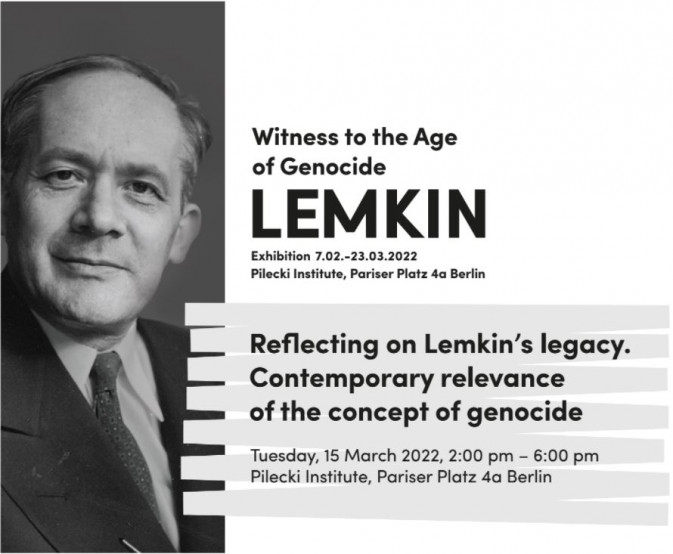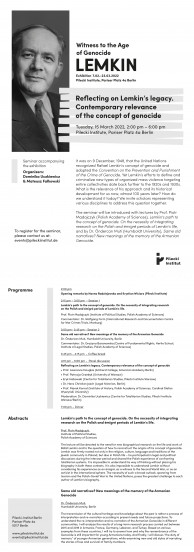Seminar on Lemkin´s legacy - Instytut Pileckiego
Seminar on Lemkin´s legacy
"Reflecting on Lemkin’s legacy. Contemporary relevance of the concept of genocide." - Seminar accompanying the exhibition "Lemkin: Witness to the Age of Genocide"

Seminar accompanying the exhibition Lemkin: Witness to the Age of Genocide at tne Pilecki-Institut Berlin, 7.02-23.03.2022
Reflecting on Lemkin’s legacy. Contemporary relevance of the concept of genocide.
Tuesday, 15 March 2022, 2:00 pm – 6:00 pm
Pilecki Institute, Pariser Platz 4a Berlin
Organizers: Dominika Uczkiewicz & Mateusz Fałkowski
It was on 9 December, 1948, that the United Nations recognized Rafael Lemkin's concept of genocide and adopted the Convention on the Prevention and Punishment of the Crime of Genocide. Yet Lemkin’s efforts to define and criminalize new types of organized mass violence targeting entire collectivities date back further to the 1920s and 1930s. What is the relevance of his approach and its historical development for us now, almost 100 years later? How do we understand it today? We invite scholars representing various disciplines to address this question together.
The seminar will be introduced with lectures by Prof. Piotr Madajczyk from the Polish Academy of Sciences, Lemkin's path to the concept of genocide. On the necessity of integrating research on the Polish and émigré periods of Lemkin's life, and by Dr. Öndercan Muti from Humboldt University, Same old narratives? New meanings of the memory of the Armenian Genocide.
Programme (PDF)
2:00 pm Opening remarks by Hanna Radziejowska and Krystian Wiciarz (Pilecki Institute)
2:15 pm – 3:00 pm Session 1: Lemkin's path to the concept of genocide. On the necessity of integrating research on the Polish and émigré periods of Lemkin's life.
Prof. Piotr Madajczyk (Institute of Political Studies, Polish Academy of Sciences)
Commentator: Dr. Wolfgang Form (International Research and Documentation Centre for War Crimes Trials, Marburg)
3:00 pm- 3:45 pm Session 2: Same old narratives? New meanings of the memory of the Armenian Genocide
Dr. Öndercan Muti (Humboldt University, Berlin)
Commentator: Dr. Grażyna Baranowska (Centre of Fundamental Rights, Hertie School, Institute of Legal Studies, Polish Academy of Sciences)
3:45 pm- 4:15 pm coffee break
4:15 pm – 6:00 pm panel discussion: Reflecting on Lemkin’s legacy. Contemporary relevance of the concept of genocide
Prof. Lawrence Douglas (Amherst College, American Academy Berlin)
Prof. Patrycja Grzebyk (University of Warsaw)
Eryk Habowski (Centre for Totalitarian Studies, Pilecki Institute Warsaw)
Dr. Hans Christian Jasch (Legal historian, Berlin)
Prof. Marek Kornat (Institute of History, Polish Academy of Sciences, Cardinal Stefan Wyszyński University)
Moderation: Dr. Dominika Uczkiewicz (Centre for Totalitarian Studies, Pilecki Institute Warsaw/Berlin)
7:00 pm – dinner (info opcjonalne na ulotce)
Abstracts
Prof. Piotr Madajczyk, Institute of Political Studies, Polish Academy of Sciences
Lemkin's path to the concept of genocide. On the necessity of integrating research on the Polish and émigré periods of Lemkin's life
The lecture will be devoted to the need for new biographical research on the life and work of Rafał Lemkin and to the question of how to reconstruct the origins of his concept of genocide. Lemkin was firmly rooted not only in the religion, culture, language and traditions of the Jewish community in Poland, but also in Polish life – he participated in legal and political discussions during the interwar period and shared the Polish experience of confronting totalitarian systems. It is impossible to understand his way of thinking without placing his biography in both these contexts. It is also impossible to understand Lemkin without considering his experiences as an émigré, as a witness to the Second World War, or as an activist in the international sphere. The necessity of such a broad outlook, spanning from tsarism and the Polish-Soviet War to the United Nations, poses the greatest challenge to each author of Lemkin’s biography.
Dr. Öndercan Muti, Humboldt University, Berlin
Same old narratives? New meanings of the memory of the Armenian Genocide
The transmission of the cultural heritage and knowledge about the past is rather a process of interpretation and re-narration according to present needs and future projections. To understand the re-interpretation and re-narration of the Armenian Genocide in different communities, I will analyze the results of a long-term research process carried out between 2015 and 2019 in Armenia, France, Germany, Lebanon, and Turkey. Based on various examples from these countries, I will try to answer how and why the remembrance of the Genocide is still important for young Armenians today. And finally, I will discuss “the duty of memory” of younger Armenian generations, while examining new and old styles of narrating the stories of loss and survival of family members.
To register for the seminar, please contact us at: events@pileckiinstitut.de

Zobacz także
- Frohe Weihnachten!
News
Frohe Weihnachten!
Das Institut bleibt vom 22.12.2025 bis einschließlich 06.01.2026 geschlossen und ist ab dem 07.01.2026 wieder geöffnet.
- Richard Herzinger: Ein Patriot der Freiheit
News
Richard Herzinger: Ein Patriot der Freiheit
Gedenkrede und Fotos von Beisetzung
- Bekanntgabe
News
Bekanntgabe
Bekanntgabe des Ergebnisses des Auswahlverfahrens für die Leitung der Außenstelle des Pilecki-Institus
- Zum 86. Jahrestag der "Sonderaktion Krakau"
News
Zum 86. Jahrestag der "Sonderaktion Krakau"
Sie verkörpert das Wesen der deutschen Besatzung Polens: die Vernichtung der polnischen Bildungsschichten und damit der polnischen Identität. Zugleich erschließt sie universelle Lehren über die Handlungsmuster totalitärer Regime.
- Neuer Ukraine-Podcast!
News
Neuer Ukraine-Podcast!
OUT NOW! Folge 4: "Die Revolutionen von 1917-1921"
- Wir gratulieren Karl Schlögel
News
Wir gratulieren Karl Schlögel
...zum Friedenspreis des Deutschen Buchhandels!
- Nachruf für Richard Herzinger (1955–2025)
News
Nachruf für Richard Herzinger (1955–2025)
Lieber Herr Herzinger, Sie werden uns sehr, sehr fehlen – mit Ihrer herzlichen, zugleich direkten Art, Ihrem unendlichen enzyklopädischen Wissen, Ihrer moralischen Klarsicht und Ihren stets bereichernden Beiträgen in so vielen Bereichen.
- Heute geschlossen
News
Heute geschlossen
Aus betrieblichen Gründen bleibt das Institut am heutigen Samstag, den 25. Oktober, geschlossen.
- Auswahlverfahren für die Stelle des Leiters des PIlecki-Instituts in Berlin!
News
Auswahlverfahren für die Stelle des Leiters des PIlecki-Instituts in Berlin!
Alle wichtigen Infos
- Zum Tag der Deutschen Einheit
News
Zum Tag der Deutschen Einheit
Liebe Freunde, alles Gute zum 35. Jahrestag der Deutschen Einheit!
- BREAKING - OFFIZIELLE ERKLÄRUNG
News
BREAKING - OFFIZIELLE ERKLÄRUNG
Das Pilecki-Institut gibt bekannt, dass Hanna Radziejowska und Mateusz Fałkowski ihre Arbeit in der Berliner Niederlassung wieder aufnehmen.
- Karol Madaj ist neuer amtierender Direktor des Pilecki-Instituts.
News
Karol Madaj ist neuer amtierender Direktor des Pilecki-Instituts.
Die Kulturministerin Marta Cienkowska berief ihn heute in diese Funktion.